现代大学英语精读第一册Lesson2(精)
大学英语精读第一册Unit 2 重点句子理解
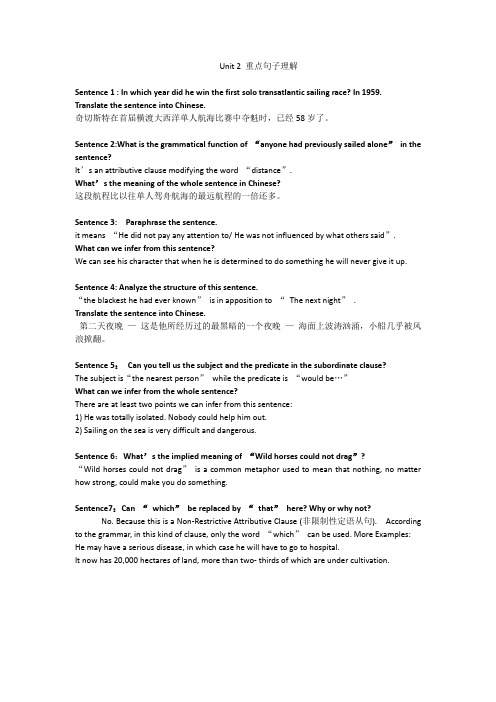
Unit 2 重点句子理解Sentence 1 : In which year did he win the first solo transatlantic sailing race? In 1959. Translate the sentence into Chinese.奇切斯特在首届横渡大西洋单人航海比赛中夺魁时,已经58岁了。
Sentence 2:What is the grammatical function of “anyone had previously sailed alone”in the sentence?It’s an attributive clause modifying the word “distance”.What’s the meaning of the whole sentence in Chinese?这段航程比以往单人驾舟航海的最远航程的一倍还多。
Sentence 3: Paraphrase the sentence.it means “He did not pay any attention to/ He was not influenced by what others said”. What can we infer from this sentence?We can see his character that when he is determined to do something he will never give it up.Sentence 4: Analyze the structure of this sentence.“the blackest he had ever known”is in apposition to “The next night”.Translate the sentence into Chinese.第二天夜晚—这是他所经历过的最黑暗的一个夜晚—海面上波涛汹涌,小船几乎被风浪掀翻。
外研社版现代大学英语精读第一册lessonPPT演示课件
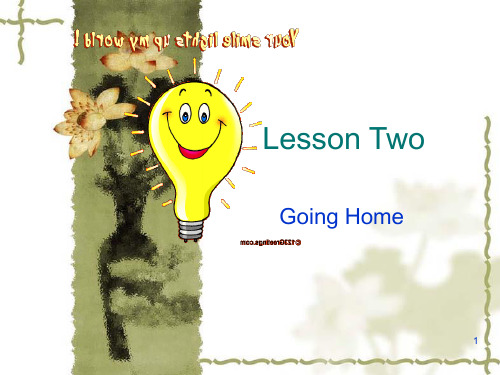
❖ Part II: Para.5—9
❖ The plot develops: where Vingo was going and what for; how the young people got interested in what was going to happen.
❖ Part III: Para.10—12
To be continued on the next page.
2
Introduction to the Text
❖ 1 The plot follows three stages
❖ Part I: Para.1—4
❖ Introduction of the setting: time—spring; place—a bus from New York to Florida; protagonist—Vingo; minor characters—six young people
5
1. “get”VP p.38
❖ get on get off get along with
❖ get to
6
2. to dream of/ about (doing) sth:
❖ to imagine and think about sth. that you would like to happen.
❖ Madeleine ~ed without trace. ❖ ~ing species ❖ Syn: Evaporate, fade ❖ Hopes of reaching an agreement are
beginning to ~. ❖ Hopes of a peace settlement are now ~ing
现代大学英语精读第一册Unit02
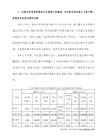
They were going to Fort Lauderdale, Florida. There were six of them, three boys and three girls, and they got on the bus at 34th Street, carrying sandwiches and wine in paper bags. They were dreaming of golden beaches and sea tides as the grey, cold spring of New York vanished behind them. Vingo was on the bus from the beginning.
当公共汽车驶过新泽西,他们开始注意到一张从未动摇。他坐在前面的年轻人,满是灰尘的脸掩盖了他的真实年龄,穿着一身棕色西服,不适合他。他的手指被弄脏了他的香烟,咬他的下嘴唇内侧。他坐在一片寂静,似乎完全没有意识到他们的存在。
Deep into the night, the bus pulled into a Howard Johnson's restaurant and everybody got off the bus except Vingo. The young people began to wonder about him, trying to imagine his life: perhaps he was a sea captain; maybe he had run away from his wife; he could be an old soldier going home. When they went back to the bus, one of the girls became so curious that she decided to engage him in a conversation. She sat down beside him and introduced herself.深夜,公共汽车驶入一个霍华德·约翰逊连锁餐馆和大家除了温格在下车。这个年轻人开始怀疑,试图弄清他的生活:也许他是一名船长,他可能已经逃离他的妻子,他会成为一个家的老兵。当他们回到车上时,他们中的一个女孩变得如此奇怪,她决定让他在谈话。她坐在他的旁边,作了自我介绍。
现代大学英语精读第一册课件 lesson2
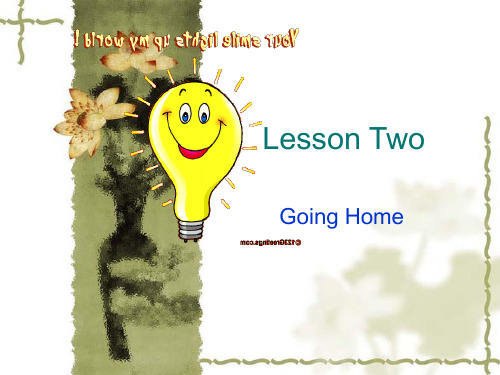
❖ 4. Mask: to cover ❖ Eyes ~ed by huge, round sunglasses ❖ Our opponents ~ their antagonism
behind sweet words. ❖ To conceal one’s annoyance with a ~
of politeness
❖ 3) What does the yellow ribbon symbolize? What did it mean to Vingo?
❖ 4) What lesson do you think thery?
Language study
Lesson Two
Going Home
Questions:
❖ 1) What do you think Vingo had done that got him in prison?
❖ 2) What kind of person do you think his wife was? Why didn’t she write to him?
❖ eg: On the way to school the boy dreamed about the football match in the afternoon.
❖ The girl dreamed of becoming a movie star.
❖ 3.vanish: to disappear suddenly; to cease to exist
6. Pull in/into(车等)到站,(船)靠岸
❖ They will pull into the station at seven sharp. ❖ The train pulled into the station on time.
(完整word版)现代大学英语精读第一册课后答案(word文档良心出品)
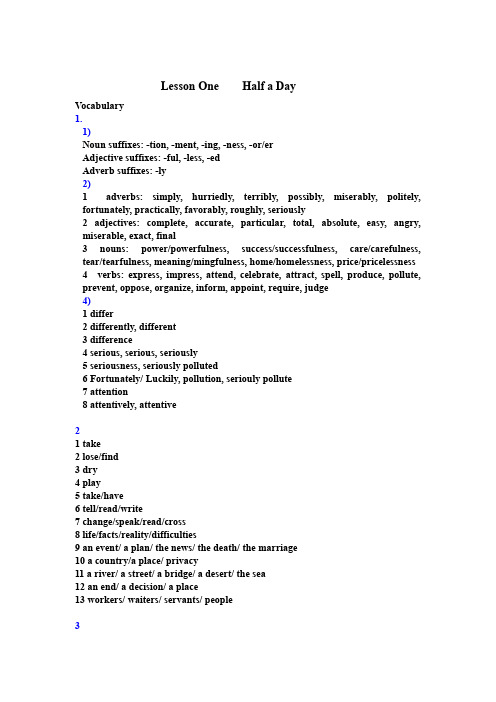
Lesson One Half a DayVocabulary1.1)Noun suffixes: -tion, -ment, -ing, -ness, -or/erAdjective suffixes: -ful, -less, -edAdverb suffixes: -ly2)1 adverbs: simply, hurriedly, terribly, possibly, miserably, politely, fortunately, practically, favorably, roughly, seriously2 adjectives: complete, accurate, particular, total, absolute, easy, angry, miserable, exact, final3 nouns: power/powerfulness, success/successfulness, care/carefulness, tear/tearfulness, meaning/mingfulness, home/homelessness, price/pricelessness4 verbs: express, impress, attend, celebrate, attract, spell, produce, pollute, prevent, oppose, organize, inform, appoint, require, judge4)1 differ2 differently, different3 difference4 serious, serious, seriously5 seriousness, seriously polluted6 Fortunately/ Luckily, pollution, seriouly pollute7 attention8 attentively, attentive21 take2 lose/find3 dry4 play5 take/have6 tell/read/write7 change/speak/read/cross8 life/facts/reality/difficulties9 an event/ a plan/ the news/ the death/ the marriage10 a country/a place/ privacy11 a river/ a street/ a bridge/ a desert/ the sea12 an end/ a decision/ a place13 workers/ waiters/ servants/ people31 on their own2 show off3 burst into4 given rise to5 brought about6 to resort to7 clinging to8 gave rise to9 took advantage of10 in vain, make, out of4 Translation1 They took advantage of our helpless situation and took over our company2 Although there are still difficulties ahead of us, I am sure that we Chinese people will have the wisdom to bring about the peaceful unification of your country on our own3 It’s wrong to put emphasis on noting but GDP. It will give rise to many serious problems.4 He loves to show off his wealth, but that is all in vain. People still avoid him as though he were poison.5 He soon fell in love with the village and was determined to make it a beautiful garden together with other villagers.6 We must spend more money fighting against global warming. In addtion, we must resort to tough laws. It is not just a matter of money.7 When the police arrived at the school, the students and teachers were still in a daze.8 This corrupt official was still clinging to his power. He refused to step aside.9 When the man finally came into view, I found it was my father. I didn’t know how he managed to find this place in the blinding snow. At that moment, I burst into tears.10 She glanced at him from time to time. It was the first time in her life that she had found herself looking at a young man like that.5 fill in the blanks with the correct prep. or ad.1 of2 from3 for4 out5 up6 up7 up for8 out9 with10 of12 of13 up61 the door lock, very angry2 the city gate wide open, playing the guqin, very strange3 quite obvious/clear, his successor4 worried/anxious, talking to yourself5 so heavily polluted, pay the price6 the ground shaking/trembling/quaking, rolling down7 laugh, laugh himself8 put these things in order, do it9 lying in the grass, covered with blood10 interested in gardening or painting, keep him busy11 hear her say, put off/postponed71 High/tall, huge2 vast, high3 tall, big/large4 every, affairs5 matter, countries/nations, big/huge6 affair, nation, matter7 state8 a few, big/huge/great, high9 everything, something10 anybody, any, nothing, nothing11 little, few, a little, a fewGrammar Work2 Fill in the blanks with correct forms.(1)Had overslept(2)Had invited(3)Was born; had left(4)Had gone; told(5)Had worked; were admitted;(6)loved; had always been7 was, had been8 became, had read9 returned, came10 met, had once treated, said, was, had done, gorgave, asked1 easy2 beginning3 But4 suddenly5 worried6 If7 master8 number9 habit10 go5.1 takes2 turn a boy into a man/ make a man out of a boy3 tried to persuade4 had taken place5 searched his room for6 failed7 take advantage of8 would9 made/have made10 had imagined college was a paradise。
现代大学英语精读1(第二版)1-10单元课文翻译
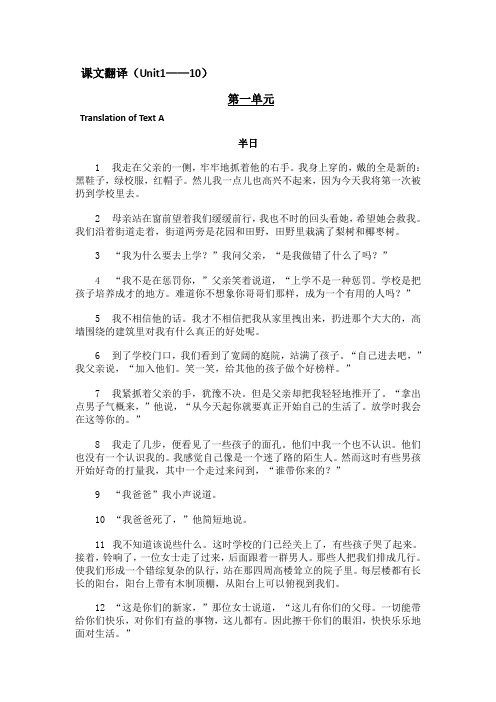
课文翻译(Unit1——10)第一单元Translation of Text A半日1我走在父亲的一侧,牢牢地抓着他的右手。
我身上穿的,戴的全是新的:黑鞋子,绿校服,红帽子。
然儿我一点儿也高兴不起来,因为今天我将第一次被扔到学校里去。
2母亲站在窗前望着我们缓缓前行,我也不时的回头看她,希望她会救我。
我们沿着街道走着,街道两旁是花园和田野,田野里栽满了梨树和椰枣树。
3“我为什么要去上学?”我问父亲,“是我做错了什么了吗?”4“我不是在惩罚你,”父亲笑着说道,“上学不是一种惩罚。
学校是把孩子培养成才的地方。
难道你不想象你哥哥们那样,成为一个有用的人吗?”5我不相信他的话。
我才不相信把我从家里拽出来,扔进那个大大的,高墙围绕的建筑里对我有什么真正的好处呢。
6到了学校门口,我们看到了宽阔的庭院,站满了孩子。
“自己进去吧,”我父亲说,“加入他们。
笑一笑,给其他的孩子做个好榜样。
”7我紧抓着父亲的手,犹豫不决。
但是父亲却把我轻轻地推开了。
“拿出点男子气概来,”他说,“从今天起你就要真正开始自己的生活了。
放学时我会在这等你的。
”8我走了几步,便看见了一些孩子的面孔。
他们中我一个也不认识。
他们也没有一个认识我的。
我感觉自己像是一个迷了路的陌生人。
然而这时有些男孩开始好奇的打量我,其中一个走过来问到,“谁带你来的?”9“我爸爸”我小声说道。
10“我爸爸死了,”他简短地说。
11我不知道该说些什么。
这时学校的门已经关上了,有些孩子哭了起来。
接着,铃响了,一位女士走了过来,后面跟着一群男人。
那些人把我们排成几行。
使我们形成一个错综复杂的队行,站在那四周高楼耸立的院子里。
每层楼都有长长的阳台,阳台上带有木制顶棚,从阳台上可以俯视到我们。
12“这是你们的新家,”那位女士说道,“这儿有你们的父母。
一切能带给你们快乐,对你们有益的事物,这儿都有。
因此擦干你们的眼泪,快快乐乐地面对生活。
”13这样看来我之前的顾虑都是毫无根据的了。
现代大学英语精读lesson2

Oblige v. (Pa. 59)
1 oblige sb to do sth : require, bind by a promise, oath, etc.
The law oblige parents to send their children to school for at least nine years in China.
2 Her son cannot speak a word at the age of 2, which gets on her nerves.
Turn on (Pa.84)
1 turn on sb: become hostile to; attack The dog turned on the man who came off the
1 choice between two things You have the alternative of working hard and
being successful or of being idle and facing the failure. 2 one or more than two possibilities Can you give us an alternative to what you have proposed?
Basics of Mystery story
Easier - A mystery is something that is difficult to explain or understand. Mysteries are also stories where a problem, crime, or puzzle must be solved.
Powder one’s nose (Pa58)
现代大学英语精读_1lesson 2

The Boy
and
the Bank Officer
Philip Ross
Warm-up: Bank Vocabulary (1/2)
How many of the following bank-related words do you recognize?
A.T.M .(automatic teller machine amount in figures amount in words annual interest rate apply for/grant a loan Bank/pass/account book bill blank check/cheque by installment cash change check/cheque account chquebook/checkbook clerk coin collateral commercial/merchant bank 自动取款机 counter credit card 小写金额 current account 大写金额 daily interest account 年利率 debt 申请/批准贷款 denomination/face value 存折 deposit account 钞票 dime 空白支票 draw/withdraw 分期付款 earn interest 现金 exchange rate 找零 expense account 支票帐户 extension 支票簿 fill out/in a form 柜台职员 full refund 硬币 money in fives/tens 担保物 joint account 商业银行 柜台 信用卡 活期存款帐户 按天计息帐户 债务 面额 定期存款帐户 (美加)十分硬币 提款 赚取利息 汇率 公款支付帐户 延期 填写 全额偿还 五元/十元面额 联名帐户
- 1、下载文档前请自行甄别文档内容的完整性,平台不提供额外的编辑、内容补充、找答案等附加服务。
- 2、"仅部分预览"的文档,不可在线预览部分如存在完整性等问题,可反馈申请退款(可完整预览的文档不适用该条件!)。
- 3、如文档侵犯您的权益,请联系客服反馈,我们会尽快为您处理(人工客服工作时间:9:00-18:30)。
Lesson Two Going HomeTeaching Objectives:A. To know the background information about the author and the text;B. To acquire the key words, rhetorical devices, and word-formation;A. To understand the connotation of the title and main idea of the text.Teaching Procedure:I. Pre-task1. Warm upListen to a song and answer the questions:What kind of music is it? (country musicWhat is the key word? (homeWhat is the general meaning of the song?Individual opinions:●This might be the first time you left yo ur home, then do you miss your home?●Can you describe what kind of feeling it is when you are homesick?●What attracts you most as you think of home?2. Background information about the authorAuthor:Pete Hamill was born in Brooklyn, N. Y. in 1935. He attended Mexico City College in 1956— 1957, studying painting and writing. He has been a columnist for the New York Post, the Daily News, and New York Newsday, and has won many journalistic awards. At the same time, Hamill has pursued a career as a fiction writer, producing 8 novels and 2 collections of short stories. His 1997 novel, Snow in August, was on the New York Times bestseller list for four months. His memoir, A Drinking Life , was on the same New York Times list for 13 weeksII. Task cycle:Theme of the text:●The ability to forgive and forget is important in all human relationships.Mutual care and affection among people, esp. among strangers are important, too. Structure of the text:This text can be divided into three parts:Part I (paras.1-4 about: introduction of the story, including the protagonist, the setting.Part II. ( paras.5-9 about: Vingo began to relate his story.Part III(paras.10-12 about: Vingo was forgiven and welcomed home.In-class discussion:Question : What are the elements of this story?Answer : Protagonists : VingoSetting : on a bus from New York to FloridaPlot : an ex-con on his way homeDetailed study of the Text:To dream of/ about (doing sth.: to imagine and think about sth. that you would liketo happen,e.g. 这个女孩梦想成为明星。
The girl dreamed of becoming a movie star.vanish : v. to disappear suddenly, esp. in a way that cannot easily bee.g. 南非的很多物种已经灭绝。
Many species in South America have vanished completely.Expressions about vanish:vanish from sight消失不见 vanish into the void化为乌有vanish into thin air从人间蒸发掉 vanish without trace消失得无影无踪The whole sentence It was a grey, cold day in spring. As the bus left New York City, these young people were thinking about what they would enjoy in Florida---the golden beaches and tides of the sea.2 Vingo was on the bus from the beginning. (para 1Question : What information can we get from this sentence?Answer : This sentence introduces the main character of the story. He is not one of the six young people going to Florida. Throughout the story, he is something of a mystery. We are never told his age, why he had been in prison, what his life has been before, ect. However, what we want to know most is probably where he was going and what was worrying him.to pass (a place: to go past a place without entering,e.g. 在她去工作的路上,她路过了一家超市。
On her way to work, she passed a supermarket.The whole sentence: to go through a town, etc., perhaps stopping there for a short time, but not stayingmask: v. to hide the truth about how you feele.g. mask one’ s fea r by a show of confidence.表现得自信以掩饰恐惧n. an expression that hides one’ s true feelings.e.g. Her confident manner is really a mask of fear.他自信的表现就是对恐惧的一种掩饰。
dressed in a … : This past participle phrase is used to tell the readers more about the subject of the sentence “ he ”to fit (sb.: to be the right size or shape for sb.,e.g. Cinderella’ s sisters tried the shoes, but they didn’ t fit.灰姑娘的姐姐们试穿了这双鞋,但都不适合。
The whole sentence: He sat in front of the young people. You could hardly tell how old he was because his face was covered with dust.5 … (para 2stain :v. change the color of sthe.g. 常年吸烟,她的手指被熏黄了。
Her fingers were stained yellow from years of smoking.The whole sentence: His fingers were yellow because he had smoked a lot.6 … and he chewed the in side of his lop a lot. (para 2The whole sentence: he repeatedly bit the inside of his lower lip, which showed his nervousness.7.the others. (para 2unaware of sth.: not knowing or realizing that sth is happeninge.g. 他在电脑前工作数小时,完全没有意识到外面的声音。
He worked at his computer for hours, unaware of the noise outside.The whole sentence: He sat without saying anything as if he did not know there were other people around.8 Deep into the night, the Howard Johnson ’ s restaurant and everybody got off the bus except Vingo. (para 3pull in to sth: (of a train or bus to enter a station and stopThe whole sentence Late at night the bus stopped at one of the Howard Johnson fast food chain restaurants. Every passenger on the bus got off to eat, but Vingo didn’ t. 9 … one of the girls became so curious that she decidedto engage sb in conversation : to start talking to sb. and involve him or her in a conversation.to engage (sb in sth: to make sb take part in sth,e.g. I have no time to engage in gossip.我没有时间闲扯。
